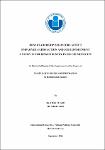| dc.description.abstract | The purpose of this study was to investigate the direct and indirect effects of
leadership behaviours on employees’ job satisfaction and job commitment in tourism
industry in Ho Chi Minh City, Viet Nam. A conceptual research framework was
developed and several hypotheses were postulated and examined. The thesis applied a
survey methodology to collect quantitative data from employees of four and five star
hotels, middle-high class restaurants, tourist attractions, travel agencies and tourist
transportation companies. The sample consisted of a total of 748 employees from
various job positions. The questionnaire survey distributed directly and sent via
emails comprised of Task - oriented Leadership Behaviour Questionnaire, Relation -
oriented Leadership Behaviour Questionnaire, Change - oriented Leadership
Behaviour Questionnaire, Ethical Leadership Behaviour Questionnaire, Participative
Leadership Behaviour Questionnaire, and Despotic Leadership Behaviour
Questionnaire.
The thesis concluded several findings. Firstly, the research found that job
satisfaction had the strongest positive impact on job commitment of employees.
Secondly, change - oriented leadership behaviour was the only factor of leadership
behaviours having positive direct impact on job commitment and had the second
strongest total positive causal effect including direct and indirect on job commitment.
Thirdly, ethical leadership behaviour is the third strongest factor positively impacting
on job commitment following its indirect impact through job satisfaction. Fourthly,
task-oriented leadership was the fourth strongest impactor indicating its positive
relationship with job commitment mediated by employee satisfaction. Lastly,
x
participative leadership behaviour was found the last factor having positive impact on
employee job commitment through employee job satisfaction.
The thesis proposed several theoretical and managerial implications. Firstly,
the study helped extend our understanding of the direct effects of leadership
behaviours in explaining employee satisfaction and job commitment. Secondly, the
study gave confirmation to our theoretical understanding of the mediator employee
satisfaction in the explanation of the effectiveness of leadership behaviours on job
commitment. Lastly, the study embraced the importance of developing leadership
behaviours in the workplace to gain the job commitment of employees. | en_US |


